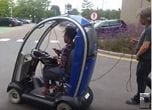Addressing the needs for improving rural mobility is a wide-ranging question. Our research to date has identified a range of innovations that could make a real difference – not all based on technology. The first requirement is organisational innovation to bring public budgets and transport planners together to address to collective mobility needs of rural people, not segregated between health, education recreation and work-related categories of travel.
Planning and infrastructure development are also needed to enable rural areas to keep pace with and embrace more radical mobility technologies that are coming on-stream. Our view is that rural hubs (e.g. https://mobihubs.eu) are an important focus for “first mile” or “last mile” mobility solutions, for both people and goods. Over time, these hubs can also provide business opportunities through increased footfall, sites for mobile public services (including health outreach services) and locations for the development of innovation hubs and flexible workspaces, thus reducing the need for longer distance commuting.
Building on this model, autonomous vehicles (such as the one being trialled by the University of Lincoln pictured here), drones, demand-responsive transport, lift-shares facilitated by smart payment technologies can operate alongside, and enhance traditional forms of public transport. These are all forming our initial thoughts for a Rural Mobility Toolkit which will be produced with Midlands Connect in September. More details to follow soon…